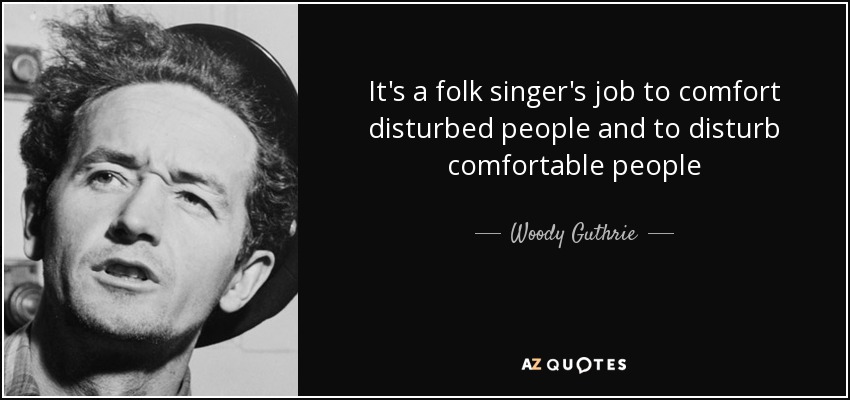Woody Guthrie (14 Jul 1912 – 3 Oct 1967): Dust Bowl Blues and Revolt
BIOGRAPHIES, 17 Jul 2017
Rene Wadlow – TRANSCEND Media Service
I am out to sing the songs that make you take pride in yourself and your work.
Tear the Fascists Down, by Woody Guthrie – CLICK TO LISTEN
Woodrow Wilson Guthrie was an American folksinger who had a creative influence on at least three generations of folksingers, such as those of his own generation, Pete Seeger and Ramblin’ Jack Elliot, the next generation Bob Dylan, Joan Baez and his son Arlo Guthrie and a more recent generation’s Bruce Springsteen.
Woody was born in Oklahoma and named after Woodrow Wilson, then the progressive governor of New Jersey and soon to be elected President. Woody’s father, a former cowboy become land speculator was active in local Democratic Party politics and also knew a wide range of songs which he passed on to his son. His mother had Huntington’s disease, a neurological disease which attacks both the body and the brain. She was institutionalized in a mental home where she died when Woody was still young. The disease seems to be hereditary as Woody as well as two of his children died of the same disease.
Oklahoma was caught up in the “Boom and Bust” economy which followed the First World War. There was a short-lived prosperity from the development of oil wells, but the oil reserves gave out quickly. The soil had been opened up to grow grain during the war period. However, the land was not really appropriate for grain farming, having been pasture land previously. With drought, the land dried and the top soil blown away by winds. Thus the term “Dust Bowl”. Many from Oklahoma, called “Okies” tried to move to California where farm land was better and where there were also non-farm jobs. The young Woody Guthrie was among the number.
However, both the authorities and the settled California population were not happy to see the rush of migrants. Only those with a set amount of money were officially welcomed. The others went around the police who guarded the highways and then often worked as underpaid farm hands and fruit pickers, a pattern followed a generation later by workers coming from Mexico.
From his father and his father’s friends, Woody had a good knowledge of folk songs, and he was able to get a job at a local California radio station playing folk and country music – a radio program which gained him some local fame. He started collecting songs from Okie farm workers, and then started singing the songs himself.
The working conditions of those working on California farms were very difficult as described by John Steinbeck in Grapes of Wrath. Efforts were made to organize the farm workers into unions. However the major industrial unions were not oriented to organizing farm workers who kept changing employers and moving from one area to another as the fruit ripened. Thus, farm union efforts were left to those outside the mainstream of labor unions – often Communists or other radicals. Woody was close to these farm union organizers, and he began a life-long cooperation with the Communist Party, although he never joined as a “card carrying” member.
Having reached his limits of California radio fame, he was encouraged to move to New York City which was then the national center for folk music. Alan Lomax who was recording folk music for an extensive Library of Congress folk music collection recorded Woody singing folk songs he knew as well as those he had written. Moses Arch, also in New York, was starting Folkways Records which became the leading recording company of folk music. He recorded and then promoted Woody’s music, especially the 1940 “Dust Bowl Ballads”. Woody wrote some 3000 songs, what he called “people’s songs” giving voice to the disenfranchised, but also humorous songs for children. Among the best known is “This Land is Your Land” written in 1940 but recorded only in 1944.
By the early 1950s, the marks of Huntington’s disease became more serious, and for the last 15 years of his life he was in institutions for the mentally ill in New Jersey and others close to New York City. His family and young folksingers like Bob Dylan would come to visit and he would sing for them. Because of Woody’s fame, there has been increased interest in the treatment and prevention of Huntington’s disease. His songs and especially his style of singing have continued to be a creative part of the US music scene.
NOTES:
See his autobiography: Bound for Glory (New York: E.P. Dutton, 1943). The title is based on his song “This Train is Bound for Glory”
For biographies see: Edward Gray. Ramblin Man. The Life and Times of Woody Guthrie (New York: W.W.Norton, 2004)
William Kaufman. Woody Guthrie: American Radical (Urbana: University of Illinois Press, 2011)
___________________________________________________
 René Wadlow is a member of the Fellowship of Reconciliation’s Task Force on the Middle East, president and U.N. representative (Geneva) of the Association of World Citizens, and editor of Transnational Perspectives. He is a member of the TRANSCEND Network for Peace, Development and Environment.
René Wadlow is a member of the Fellowship of Reconciliation’s Task Force on the Middle East, president and U.N. representative (Geneva) of the Association of World Citizens, and editor of Transnational Perspectives. He is a member of the TRANSCEND Network for Peace, Development and Environment.
This article originally appeared on Transcend Media Service (TMS) on 17 Jul 2017.
Anticopyright: Editorials and articles originated on TMS may be freely reprinted, disseminated, translated and used as background material, provided an acknowledgement and link to the source, TMS: Woody Guthrie (14 Jul 1912 – 3 Oct 1967): Dust Bowl Blues and Revolt, is included. Thank you.
If you enjoyed this article, please donate to TMS to join the growing list of TMS Supporters.

This work is licensed under a CC BY-NC 4.0 License.
